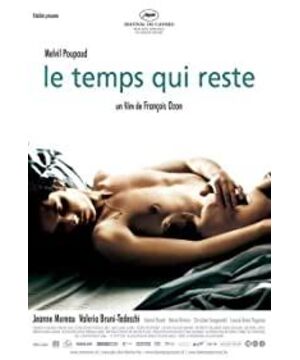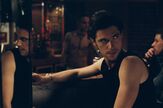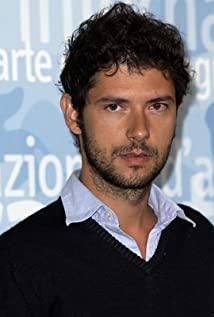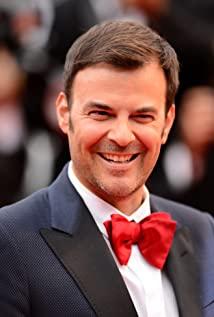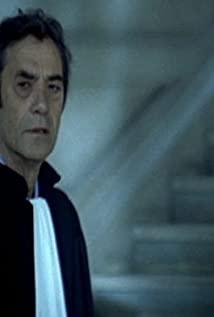Although the plot of this film is simple, the theme is very profound. Death, like love, are both eternal themes of literature and art. Unfortunately, there are only a handful of works with weighty death themes.
Roman, a 30-year-old photographer, has the best time in his life. Young handsome, successful in career, and a young partner to accompany him. However, this happiness is so fragile. One day, he was told that he had cancer. Even if he risked receiving radiotherapy and chemotherapy, he only had a 5% chance of letting his life go on. After refusing this cruel treatment, only three months were left in his life. On the way home, he tried to announce this to his parents. However, he still gave up. Habitually quarreled with her sister, and broke up unhappy. This talented photographer has a withdrawn personality, and his relationship with his family is average, and he has few friends around him. Facing the sudden death notice, he was afraid, and he was silent. He proposed to let his father drive himself on this journey home. Because he knew that he could only say goodbye to him in this way. He told his father that he knew that the relationship between him and his mother had been cracked a long time ago, and he wondered why he still had to live together after the relationship broke down. "Because of love." Father replied. Yes, because of love. A young couple formed a family of four. Because of love, they are willing to wait for this marriage. Because of love, because they are a family, even if the children have their own new homes, have their own families, and have their own new lives. From home to home, there is Roman's little lover waiting for his return. The young boy was playing the game console boredly in the living room. Roman knows that he has little time, and his lover can no longer rely on him to do nothing all day long. So Roman decided to chase him away mercilessly. As a result, Roman became solitary, passing his last time lonely and peacefully.
He decided to find his grandmother and confess his condition to her grandmother. His relationship with his grandmother in the past was not necessarily close, but at this moment, he was able to find the comfort he wanted. The old grandmother has been estranged from his father for a long time, so he can tell his grandmother frankly that the reason he told her about this is because she is also a dying person. Sooner or later, she will feel the taste of dying in solitude. . Or, she had already foreseen it. Looking for memories of my childhood in my grandmother's home. Although he was fading away as a child, waiting for his death, he has no future to look forward to. The only thing left is nothing but memories. Maybe nothingness is real to some extent. He decided to reconcile with his sister, so he replied to her sister's call. He hid behind a certain tree in the park, peeking at his sister who was walking with his son. Is this a goodbye for him and sister? Taking out the camera, he took the back of his sister and son for the first time, and left without a trace. Loneliness scared him, so he dated his little lover who was driven away, and lied that he had found another man. Knowing that the little lover can already be self-reliant, he feels a little relieved. He tried to find the last comfort from his little lover's body temperature, but was refused. He still didn't have the courage to tell his illness, maybe he felt that even in the face of death, he must die with dignity. He almost finished this last days alone. A waitress wanted to borrow from him to have a child, but at first he instinctively refused. But thinking that he was running out of time, did he find the couple to continue his life? He even made a will to hand over all his property to this little life. He actually knew very well that this little guy might never know the story before his birth. So what does it matter? Just let yourself walk calmly when you leave. He was getting thinner and thinner, and he shaved off his curly hair. He decided to go to the beach to bask in the sun. On the train, he saw a mother nursing her baby tenderly. He seemed to think it was right to live a life. He stretched out his body in the sea for the last time, lying quietly on the beach, enjoying the sunshine at the last moment of his life. The recollection of his childhood has not stopped, he can always see the footprints of his own growth in the shadow of others. At sunset, the tourists dispersed one by one, leaving only the body of a man lying there quietly. It looks so solemn against the afterglow of the daylight. Perhaps soon, a lifeguard will come and take him away, and then notify his family. Then, everyone who is kept in the dark will understand what happened in the past three months. Maybe they will find that he left behind a little life, maybe he will find that his last
The film's directing technique is more beautiful, not deliberately sensational, and the overall handling is simple and plain. What is amazing is the performance of the actor Melville Bub. The audience really can't find anything to be picky about.
Please look at the movie poster: a naked man lying peacefully on a light blue bath towel, his eyes looking around a little life. Perhaps this is the meaning of life. As for the inconspicuous cross, perhaps death is just a journey for people to return to the embrace of God. Perhaps, religion does have the power to allow people to accept the cycle of life calmly. Birth, old age, sickness and death are just the will of God. Perhaps, when death is approaching, we will naturally be redeemed.
François Auzon is a French director who emerged in the 1990s. On November 15, 1967, he was born in a middle-class family in Paris. He liked film since he was a child. After obtaining a master's degree in film at the University of Paris I, he was admitted to the Directing Department of the French Higher Vocational College of Video and Sound. Since then, a large number of short films have been shot with super 8/16mm cameras. After he directed his first feature film "Family of Lost Souls" in 1998, his masterpieces have continued. So far, eight films have come out. Many people regard him as the most promising Mesozoic director in France today, and he has been given various titles. Some people say that he inherited the mantle of Hitchcock or Chabrol (good at suspense and thriller), and some people say that he is a follower of Fassbinder (multiple indoor dramas, the theme is related to lust). But these early evaluations proved to be incapable of summarizing Ou Zong's creation. In his current feature films, you can find the shadows of many masters ranging from Bergman to Almodovar. His own style is constantly changing, and the types and themes of the films he tried have become more abundant. After all, Ou Zong is less than 40 years old. In "The Last Time" in 2005, many people exclaimed that Ou Zong has gradually shown the master's ingenuity. He is good at picking up inspiration from his predecessors, but in essence, he clearly deviates from the French film tradition. People can feel It has a strong French taste, but it is difficult to see the influence of the new wave.
Ou Zong's creative power is amazing. When he was 18 to 22 years old, he shot more than 30 short films, and the cost of each did not exceed 300 francs. After graduating from the Higher Vocational College of Video and Sound, he made short films for five years. Since 1998, he has been shooting feature films. These works are inseparable from the topic of eroticism, but if you want to summarize his video style, there is no one that can be summarized. The only standard is "change".
It is true that people can deconstruct the surface technically, only to find that Ou Zong’s photography is also adjusted and changed with different types of movies. For example, in his recent films, he can’t see the faces used in the 20th century. With close-ups, the tones have also begun to become fuller and warmer-this is obviously suitable for the overall change. In addition, people found that Ou Zong took the initiative to change the subject matter. From his early attention to the abnormal mentality of middle-class family members' alienation ("Family of Lost Souls", "Eight Women"), he gradually turned to the pure dialogue about emotional life in "Under the Sand" and "5×2". In "The Last Time", Ou Zong again showed reconciliation with society and family. He can be summed up as follows: in his own growth, he is willing to try various possibilities and try to learn from various means of expression, without being restricted by conventions. For example, in the five periods of "5×2", he adopted five different styles. According to his own statement, he used the traditional indoor drama shooting method in the first section, and there is a typical American in the wedding scene. The characteristics, and the encounter part on the beach, directly borrowed from Eric Romer.
Therefore, Ou Zong is so difficult to define according to traditional standards. Sometimes you can see that he skillfully uses Godard's symbolism, sometimes gloomily conveys Fassbinder’s erotic exploration, and sometimes creates it like Hitchcock. In the thrilling atmosphere, there are more names of masters that can be brought up... In the face of all kinds of criticisms or praises that arise from this, he himself is calm. All techniques are nothing but tools, all transformations are nothing but exploration, all subversions are nothing but rebirth, masters’ methods can be borrowed, but Ou Zong is by no means a person living in the shadow of a master, even if he will be called a master in the near future. For him, "Everything is outside the standard."
The subjects explored by Ouzong's films include: 1. Communication: Perhaps most people's first impression of Ouzong's films is his naked expression of lust. However, the topic that runs through Ouzong's film career should be the distress of incomplete communication between people. He often alienates or magnifies this communication barrier, unable to understand each other, and then hates each other. This is the subjective root of all the chaos, betrayal, and murder of the characters under his lens. Even in commercial films like "Eight Women", cheating and incest are his indispensable means of whipping people's dark desires. In his works, most of the most difficult to communicate are the conflicts between relatives, family members, and lovers. On the contrary, there is a mysterious attraction between strangers, allowing them to open their hearts easily. 2. Body: The reason why I say "body" instead of "erotic" is because in Ou Zong's lens, his love scene or emotion is not hot, or desire is not turbulent. It looks more than intense but not affectionate. In most cases, Ou Zong takes sex, the most primitive form of human communication, as a continuation of the previous element. In "Dan Chai Rie Hu", sensuality replaced words as the dominant means, and in "5×2", the last time the couple had sex, from content to emotion, completed the complete breakdown of the relationship between husband and wife. But for those bodies outside of desire, Ou Zong can always shoot them clean and pure. He seems to be trying his best to find the naked heart under the naked body. 3. Women: Ou Zong is good at photographing women. On the one hand, he thinks that many "intimate" things are not good for direct performance. It is best to be a metaphor behind a woman. On the other hand, he thinks that female actors bear more things than male actors. When you can get into the drama. Therefore, the female characters in the plays he directed are often more brilliant than men. He can show the cautious charm of women of all classes, personalities, and ages, and the actresses he works with can often benefit from acting. The eight actresses in "Eight Women" won the Silver Bear Award at the Berlin Film Festival, and the Artistic Achievement Award for All Actresses' Performances. In addition, Hua Weili Teqi performed well in "5×2". Venice was named a queen. And "Under the Sand" and "Swimming Pool" also made Charlotte Hamplin's old tree bloom with new flowers. 4. Homosexuality: In the Ouzong film that does not focus on women, the key character in the whole film will be the male "comrade" ("Dry Wood and Fire", "The Last Time"), or bisexual men, in short, heterosexual men. Not much good... In all Ou Zong's movies, there are bound to be gay, or bisexual, or obvious homosexuality. This is actually Ouzong’s attitude. Homosexuality and heterosexuality are no different. They exist and live by your side, and gay people tend to communicate better and understand each other more easily. 5. Middle class: Ou Zong was born in a middle-class intellectual family. Most of his feature films focus on the family conflicts of the middle class, but rarely show the life distress of ordinary people in the city. Therefore, he has also been criticized by the orthodox film school. On the one hand, this must be due to his growth experience. On the one hand, he himself said that he hopes to express the emotions of the characters purely without being too much interfered by the external forces of the society. In "5×2", the content of the work of the two was deliberately reduced, and the family in "Lost Souls Family" did almost everything except work. Like "Eight Women", the only dad who worked finally All died of unfavorable lives. In fact, the middle class in Ouzong’s lens, although they have no worries about food and clothing, their inner darkness is more likely to be magnified by alienation. Therefore, they are also suffering. Incest and suicide are not uncommon. 6. Music and dance: The actor of "Dry Chai Rai Hu" commented on Ou Zong, saying that he is a serious person, but he is extremely passionate in dancing and is a complete dance lover. Ou Zong not only used music and dance to express his personalities, but he was also extremely demanding. The taste of music is both classical and popular, and the original sound of the movie is often well received; in the dances in "5×2", Ou Zong has strict requirements and instructions on dance style and dress, and strives to combine music and dance. The subtle changes in their feelings are conveyed to the audience. 7. Indoor and beach: These are the two scenes that appear the most in Ouzong's movies. Luxury villas can be regarded as one of the characteristics of the middle class. The enclosed large space obviously contributes to the abnormal development of personality. The beach naturally has a special meaning to the French. No matter what the big thing is, going to the southern beach for vacation is a life goal that the French must accomplish every year. Needless to say, short films, there are also many pure indoor dramas in the early feature films ("Lost Souls Family", "Dry Wood Fire", "Eight Women"), the main scene of "Swimming Pool" is also a villa with few people coming and going, swimming pool It can also be regarded as an alternative symbol of the beach. On the beach, which symbolizes the entire French society, Ou Zong has already photographed a person's life, childhood memories, lover encounters and betrayals, wonderful sex, murder and natural death. 8.
After the release of "The Last Time", many people lamented the emotions flowing from Ouzong's lens, and gave the evaluation of "the new director who is most hopeful to save the French film". However, for François Ozon, he firmly refused to repeat and declined everyone's good faith expectations of him. This is in full compliance with the style of "François Truffaut II". His new film "Angel" has abandoned the modern themes that have been played, telling the legend of an unwilling woman. François Auzon keeps innovating, and his films are always worth looking forward to.
View more about Time to Leave reviews


